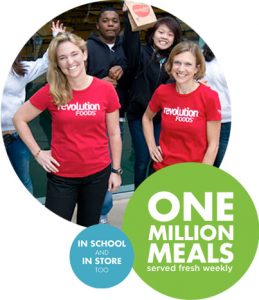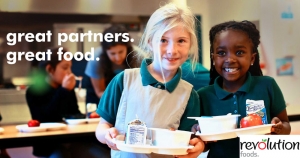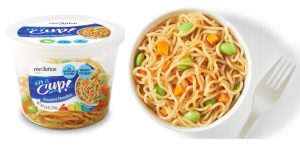When I went to school, the last thing I wanted to do was eat lunch prepared there. Yuck!
It’s different now. Revolution Foods has changed the system. It provides delicious and nutritious meals to schools at an affordable price. Food for schools is a $16 billion industry. Because it targets free or reduced-price meal programs subsidized by federal funding, Revolution Foods’ price point must be low. It is $3 per meal. The company donates 1% of retail product sales to a “Feeding Good Fund” that provides grants to schools who need equipment to serve freshly prepared meals to their students.
A chance meeting leads to the creation of a $100 million business
It was kismet that Kristin Groos Richmond met Kirsten Saenz Tobey in 2006 when they both went back to school to get their MBAs at the University of California, Berkeley, Haas School of Business. Both were educators who believed that for kids to do well in school, they needed the right fuel – fresh nutritious food. Richmond saw the impact good food made when she founded a school in Nairobi. Kids were more engaged and focused, and their ability to learn improved.
Nutritious food won’t do kids any good if they won’t eat it. Revolution Food is kid-inspired and chef-crafted. “We listen, learn and iterate,” said Richmond. Surveys and focus groups are conducted regularly by Revolution Foods. Chefs also sit down with students at school. Menus are customized to reflect regional taste differences – serving jambalaya in New Orleans and tamales in San Francisco.
Many students rely on school meals as their primary source of nutrition. Not just lunch but breakfast, supper and snack time. Revolution Foods provides 1.5 million meals per week to students in 1,000 schools in 30 cities nationwide.
Parents and kids started asking if they could get Revolution Foods meals at home. “We wanted to provide a solution for families that makes life easier,” said Richmond. Revolution Foods now sells a growing line of meals and snacks in 4,000 groceries including Safeway, Whole Foods, Walmart and Target.
The company generates more than $100 million in revenues per year.
The opportunity to make impact and a high return on investment attracted investors
Most investors don’t get that you can make an impact and get a high return on investment. “It was very difficult for the founders to attract investment because the company’s purpose was ‘off-spec’ from traditional venture business models,” says Nancy Pfund, founder and managing partner ofDBL was attracted by the opportunity to address health problems in low-income communities as well as to provide jobs in those communities. DBL was an early seed invest as wasRSF Social Finance.
“Take the time to find the right investors,” said Richmond. “When you do, magic happens.” “Smart investors” understand the challenges you face and may have the expertise to help or know of others who can. They provide additional funding as you scale and can connect you to other money as well. They also provide referrals to top talent and suppliers. Others investors include Oak Investment Partners Catamount Ventures,Revolution Growth, The Westly Group, Emerson Collective and New School Venture Fund.These VCs may also sit on your board, like Steve Case, AOL co-founder, of Revolution Ventures. Revolution Foods is proof that the right matches can be found. It has raised nearly $100 million.
Creating jobs in low income areas
Revolution Foods employs more than 2,000 people in hubs that are near the schools it serves. In 2013, it ranked the #2 fastest growing, inner-city company in America for the second year in a row, according to the initiative for a Competitive Inner City (ICIC).
“You are only as successful as your team,” says Richmond. “Our mission has given us a real advantage in recruiting talent.” It’s not just millennials who are drawn to this values-based business. People of every generation – including older more seasoned executives – are.
Expanding through acquisition
Revolution Foods is acquiring companies/products that need infrastructure to scale. “Entrepreneurs can build their own or join a like-minded team,” said Richmond. Companies don’t have to be mom-founded but the first two – Batter World and Lunch Bundles – are.
By Geri Stengel for Forbes.com




